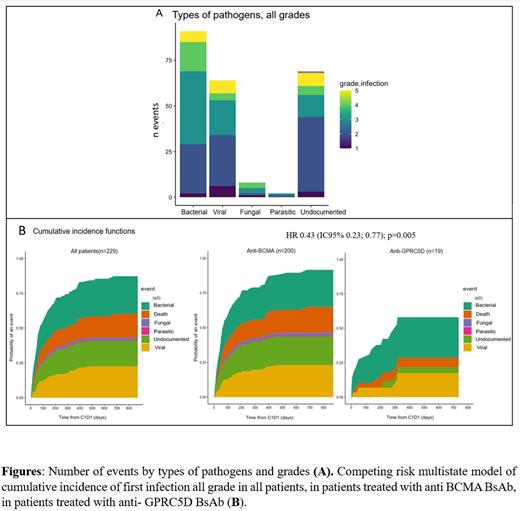Background. Bispecific antibodies (BsAb) are a new effective treatment for relapsed/refractory multiple myeloma (RRMM). Although these immunotherapies are well tolerated, infectious complications emerged as a predominant issue, mainly with anti-BCMA BsAb. Recent guidelines were presented to prevent and manage these complications based on clinical trials safety signals. In this study, we aimed to report incidence and characteristics of infectious complications in patients treated with anti-BCMA and anti-GPRC5D BsAb.
Methods. A retrospective study was conducted in 13 tertiary centers including patients with RRMM treated by BsAb between December 2020 and February 2023. We reported infectious complications events requiring specific treatment, delay in BsAb administration or hospitalisation and occurring up to three months after interruption of treatment.
Results. Among the 229 patients included, 200 (87%) received an anti-BCMA BsAb with teclistamab (n=153, 67%) or elranatamab (n=47, 20%) and 29 patients (13%) received an anti-GPRC5D BsAb with talquetamab. 40% (n=90) of patients were treated in monotherapy, 42% (n=94) had dexamethasone in addition to the BsAb after step up doses and 18% (n=41) received a combination with an anti CD38, immunomodulatory treatment, proteasome inhibitor or other. The median age was 67 years (range 38-85), median of prior line of therapy was 4 (range 0-15). 62 (32%) patients had a high cytogenetic risk and 187 (82%) had a triple refractory disease.
With a median follow up of 7 months (IQR 4-12 months) 234 infectious events were documented in 142 patients (62%) including 53% grade ≥ 3 and 8.4% (n=19) deaths due to infection. All infections grade ≥ 4 (n= 48; 20.6%) occurred in patients treated with anti-BCMA BsAb.
Predominant localisation was pulmonary tract (n= 97, 41%) and disseminated infection (n=52, 22%) . Among the documented infections, 91 (55%) were bacterial, 64 (39%) were viral and 8 (5%) were fungal (Figure 1A). Two (1.2%) infectious events were from a parasite. Most frequent pathogens were Enterobacteriaceae (n=28, 12%), SARS-CoV-2 (n=19, 8%), anaerobic bacteria (n=10, 4%) Pseudomonas aeroginosa (n=6, 2.5%). Invasive pulmonary aspergillosis was found in 6 (2.5%) patients, and 2 (1.2%) event was PML (progressive multifocal leukoencephalopathy) and 1 (0.6%) was disseminated toxoplasmosis.
Hospitalization rate was 57% (n=131), including 13% (n=30) requiring intensive care with a median hospitalization time of 10 (range 1-111) days. Overall, n=113 (47%) of the infectious events had an impact on the course of treatment. Illustrated by interruption in n=31 (14%) events, delayed administration in n=70 (32%) events or change in frequency of administration in 2 (0.9%) events.
Considering immunosuppression, 125 (68%) of these infections occurred in patients associated with hypogammaglobulinemia (<3 g/L) and 22% (n=50) in patients supplemented with intravenous immunoglobulin. Regarding infectious prophylaxis, n=104 (47%) infectious events occurred despite a bacterial prophylaxis (n=104), 91% (n=125) occurred under viral prophylaxis, 73% (n=166) with trimethoprim-sulfamethoxazole or atovaquone and 11% (n=25) with pentamidine use.
Global cumulative incidence of first infection was 70% in all patients, 73% in patients treated with
anti-BCMA and 51% with anti-GPR5CD. Treatment with anti-GPRC5D BsAb was independently
associated with a lower risk of first infection in a multivariate model adjusted for infectious
prophylaxis, and hypogammaglobulinemia, HR 0.43 (IC95% 0.23; 0.77); p=0.005 (Figure 1B).
Conclusion. This study highlights the rate of infectious event with BsAb treatment in RRMM setting. We describe higher frequency of infections in patients receiving anti-BCMA agents compare to anti-GPRC5D group. Impact on treatment administration is huge and dosing intervals strategy and prophylaxis appear necessary and effective to improve the morbidity and mortality rate of this hightly effective agents.
Disclosures
Frenzel:Pfizer: Consultancy, Other: Grant, Research Funding; Biomarin: Consultancy; Roche: Consultancy; CSL Berhing: Consultancy, Research Funding. Sonntag:Janssen, Takeda, BMS and Sanofi: Membership on an entity's Board of Directors or advisory committees. Touzeau:Bristol Myers Squibb: Honoraria, Membership on an entity's Board of Directors or advisory committees. Karlin:Amgen, Celgene, GSK, Janssen, Takeda: Consultancy; AbbVie, Amgen, Celgene, Janssen, Sanofi, Takeda: Honoraria. Macro:Janssen, Takeda: Honoraria, Other: Travel/accommodation, Research Funding; GSK, Sanofi: Honoraria. Perrot:Abbvie, Adaptive, Amgen, BMS, Janssen, Pfizer, Sanofi, Takeda: Honoraria.


